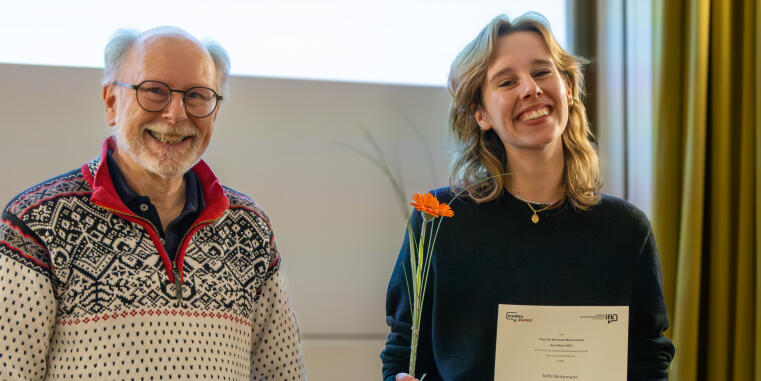

MedienAlumni Münster e.V. awards the prize for the best thesis 2023 to Sofie Beisemann
(03.02.2025) The Master's thesis on analysing reporting on the Last Generation within different media attention phases impressed the expert jury.
In her Master's thesis, Sofie Beisemann analyses how ideologically different German quality media have reported on the Last Generation in different phases of media attention.
Social movements such as the Last Generation face a particular dilemma, which explains the relevance of Sofie Beisemann's study. They have to organise radical protests in order to attract the attention of the media and thus of society. Within the media coverage, however, there is a danger that narratives will be constructed that delegitimise the movement and its protest. Although this sparks a social debate, it does not discuss the aims of the protest, but rather, for example, whether the movement's forms of protest (sit-in blockades with stickers on the streets) are legitimate.
The data basis for Sofie Beisemann's analysis is formed by 681 newspaper articles about the Last Generation from taz, ZEIT, Süddeutsche Zeitung, Frankfurter Allgemeine Zeitung and Welt in the period from January 2022 to April 2023. An automated content analysis is carried out to answer the research questions.
Through her analysis, Sofie Beisemann can impressively show that the triggering of great media attention through radical protest actions goes hand in hand with the Last Generation's loss of control over the content-related narratives associated with it (e.g. stronger climate protection). Thus, the ‘media storm’ does not generate dedicated attention for the protested problem, but rather for the debate about the radical nature of the protests. This is particularly true when the ideological bias of the movement and the newspaper do not match. Sofie Beisemann points out that only liberal media have acted to a certain extent as ‘recognising allies’ of the Last Generation.
The jury based its decision primarily on the methodological innovation and the high level of argumentation that characterises the work as a whole. The theory of social movements is comprehensively elaborated and profitably applied to the research question of the thesis. The description of the methodology is up to date and very transparently presented. The writing style of the English-language work is very professional and comparable with contributions in international specialist publications.
In addition, it provides relevant insights for research on social movements and media coverage of them. In the opinion of the jury, the thesis fully fulfils the aim of contributing to the little-researched field of media coverage within various media attention phases surrounding the protests of movements. It therefore deserves the award for best Master's thesis of 2023.
Sofie Beisemann receives prize money of 500 euros with the award from MedienAlumni Münster e.V. The prize for the best Master's thesis is awarded once a year by MedienAlumni Münster e. V. for the best Master's thesis of the previous year.
This year, the MedienAlumni Münster jury consisted of Dr Florian Wintterlin (former academic advisor at the IfK), Dr Lars-Ole Wehden (research associate at the IfK) and Dr Carla Schieb (science manager at the Institute of Reproductive Genetics at the University of Münster).
Contact person public relations:
Dr. Stephan Völlmicke
Telefon: +49 251 83-23006
Telefax: +49 251 83-21310 (Geschäftszimmer IfK)

